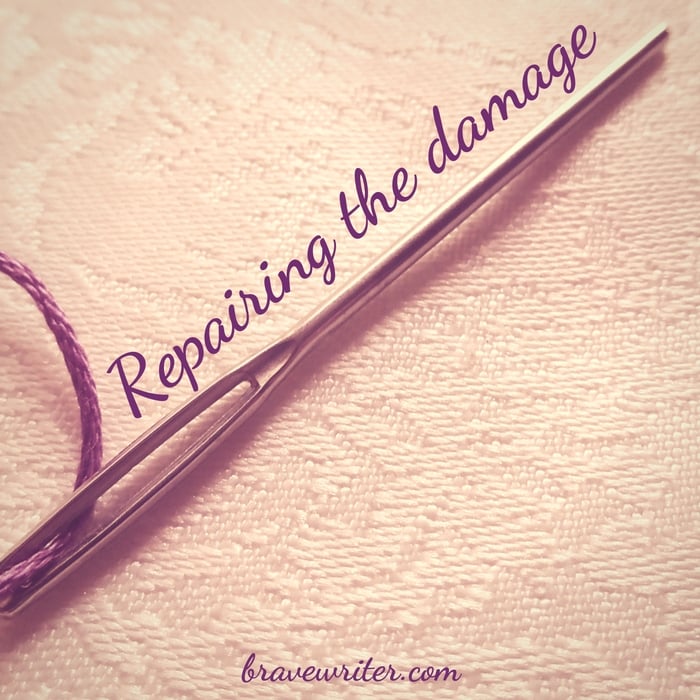Repairing the Damage

What do you do? You’ve been trying to teach your child to write using the curriculum that your best friend swears by. Your daughter, though, is slowly wilting under the structure, the requirements. She finds herself less and less willing to face the blank page. She says her hand hurts or she hates the topic, or she doesn’t think writing matters. She finally knuckles under and produces three paltry lines of stiff prose, not at all revealing the sparkle in her personality or her grasp of the topic.
In frustration, you tell her to try harder, you reduce the size of the project, you offer to write things down for her… nothing works. She continues to show you her unhappiness and you wonder to yourself if she’s just lazy, willful or both.
I like to say in workshops, in my writings, that writing problems are reasonable. We parents don’t really want to believe that because it would mean that there is some solution we haven’t yet thought of that will get our kids writing again. It’s almost easier for us if the problem our child is having is seen as a character flaw (then we can require things, punish, reward, or shame our kids into “behaving”). We are much more adept at moral lessons than creative writing solutions. We can lecture and model diligence, discipline, hard work, and denial of feelings much more easily than we can make meaningful suggestions about how to get that pen moving again through some writing solution.
Yet if it’s true that your child is generally cheerful (you know, apart from the normal doses of grouchiness that all kids and adults feel from time to time), listens to you reasonably well in other areas (will hop up to grab the napkins for lunch if you ask, helps you unload the groceries, doesn’t mind feeding the dog, will come when you call while at a store, etc.), and is mostly willing to do other areas of schoolwork (math pages, reading, history, handwriting), a problem with writing really can be understood to be a problem with writing (as in, writing feels overwhelming, hard, confusing, painful, stressful, or perplexing).
Rather than the moral lectures, let’s start over and help our kids tackle writing with a different strategy.

1) Apologize for any way that you’ve not taken complaints seriously as a writing problem.
You can simply say, “I know I’ve been hard on you about writing and it occurred to me last night that you really are struggling with writing, not with self-discipline. I see how eagerly you tackle the games you play, how you willingly help me with the dishes, how you play with your siblings and try to help them have a good time. So I know you’re a great kid. I’m realizing, however, that the way we do writing in this family is not workable. I’m going to help us shift gears and figure out a new way to do writing so that it is no longer the painful torture it has been for you. I’m sorry for being so hard on you.”
2) Write down a list of complaints.
To take your child seriously, write down a list of his chief complaints about writing. Help him to be as specific as he can. Let him see you taking him seriously by making a nice long non-judgmental list. At the end, ask him to reread it to be sure you got it all down. Then sign and date it together. Let him know you take these complaints seriously and are going to do what you can to tackle each one.
3) Take a break from writing.
Together, decide that you will take a break from writing. You can determine a time length, if you like, just be sure that you don’t make it so soon as to not be meaningful. So a two day break is meaningless. But a month is more of a real break. For some kids, a month will feel too soon. I have one child who took three years off of writing. That’s right – three years! (In that time, however, he wound up doing some writing initiated by his own imagination and desire that I supported… by the end of the three years, he told me he felt ready to tackle writing again in a more systematic way.)
4) Determine whether the list includes possible learning disabilities or language processing disorders.
Here are things to think about: Does your child mostly complain about handwriting (holding the pencil, making the letters, hurting hand, tires quickly, etc.)? If that’s the case, it is possible that your child has dysgraphia or some other handwriting impediment. Does your child complain about the struggle to think of anything to say? If so, ask if that is also true in speaking. Does your child struggle to get the words out in talking? Does your child find it difficult to recite an experience or to sequence her ideas verbally? If so, the problem could be a cognitive processing issue, not a writing one. If you suspect some issue that impairs the writing process, get an evaluation done to rule out any of these problems.
5) Research writing.
Finally, you need to get your own philosophy of writing nailed down. The Brave Writer website is chock full of help for you. I strongly recommend the Brave Writer Lifestyle section as a way to immerse yourself in the benefits of this philosophy of writing. You’d also do well to purchase The Writer’s Jungle so that you can educate yourself about how to nurture your young writers. You’ll find step-by-step support and advice for teaching writing to your kids.

















